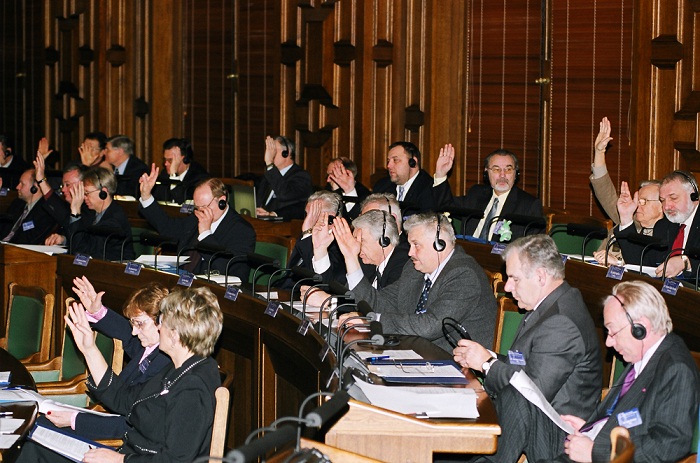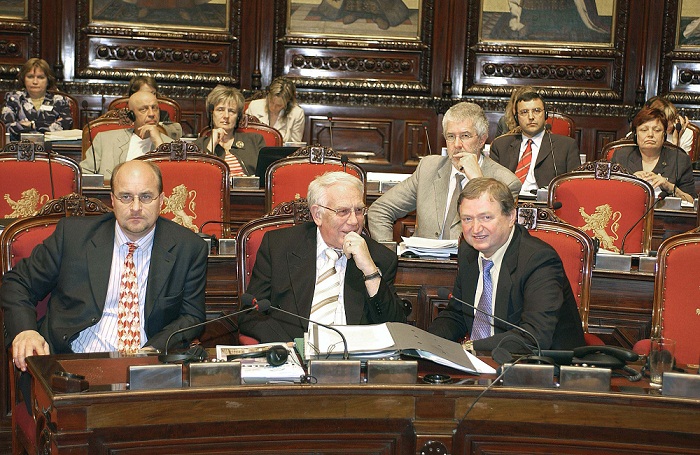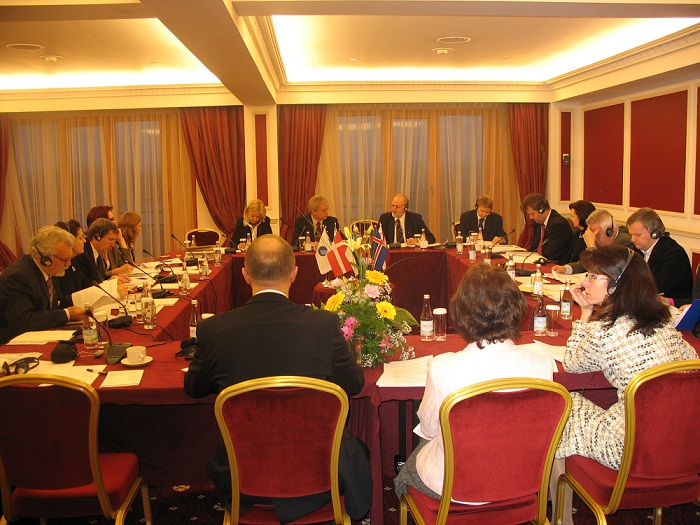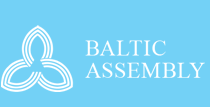Reforms of regional organisations, 2005 - 2007
The period between 2005 and 2007 is marked by significant challenges to Baltic parliamentary cooperation because discussions on a new course and strategy for Baltic cooperation were prompted by the Baltic States’ integration into the European Union and NATO, uncertainty about developing regional cooperation in Europe at large, the growing impact of globalisation, waves of reforms in most international organisations, and other factors. In the early 2004-2005, cooperation assessment and further development of cooperation after the accession of Estonia, Latvia and Lithuania to the European Union and NATO became topical on the agenda of the Baltic Assembly. The Baltic States were fully aware of the need to define new goals for cooperation among the Baltic States and within their regional organisations. The Baltic Assembly, closely coordinating its activity with the national parliaments, sought answers to the following questions:
- How to adapt to the new international situation?
- How to draw up a new cooperation agenda?
- What new operational principles and formats should be introduced in the activity of the organisation?
- How to promote regional cooperation of the Baltic States?
Thus, the fourth period can be described as a reform period in the work of the Baltic cooperation organisations. Accession of Latvia, Lithuania and Estonia to the European Union and NATO marked a new phase in the regional cooperation of the Baltic States by redefining their cooperation goals, formats and agenda.

23rd Session of the Baltic Assembly in Riga, 17-19 December 2004
During this period, cooperation among the Baltic States did not lose its usefulness or become less intense; however, regional organisations lacked clear tasks, goals and development scenarios. In order to use their cooperation potential to the full extent and strengthen the impact of the region, Estonia, Latvia and Lithuania needed political agreement on new goals.
In Baltic parliamentary discussions, a broad spectrum of scenarios for the development of the Baltic Assembly was assessed. Parliamentary debates proved that, in general, none of the involved parties denied the need for trilateral cooperation among Estonia, Latvia and Lithuania or the contribution of this cooperation to the development of internal and foreign policies of each country. Political discussions stressed that the Baltic Assembly and the Baltic Council of Ministers made it possible for Estonia, Latvia and Lithuania to harmonise their opinions and enable the international community to hear the common position of the Baltic States. The Baltic States clearly understood that by destroying the platform of trilateral cooperation they would lose one of the tools for advocating their interests in international politics, as well as the opportunity to address certain issues, for example, establishment of a Baltic energy market, in a smaller group of states. They also understood that without this framework of cooperation, each of them would have to develop bilateral relations with each country of the region individually, and that would require additional financial and human resources. In their proposals for reforms, each Baltic State had a different focus and basic requirements – principles of cooperation, strategy of cooperation, format of cooperation, and funding of cooperation. As a result, Estonia, Latvia and Lithuania agreed that the aim of the reforms of the Baltic Assembly is to prevent the overlapping and duplication of cooperation goals, activities and functions, develop more flexible and simpler mechanism for addressing issues and making decisions, and ensure efficient and problem-oriented parliamentary cooperation.

Session of the Benelux Parliament in Brussels, 25-26 June 2004
In the period between 2005 and 2007, the Baltic Assembly implemented comprehensive reforms that were based on several goals: 1) defining new goals and agendas for Baltic parliamentary cooperation; 2) devising a long-term development strategy of the Baltic Assembly; 3) introduction of structural reforms of the Baltic Assembly aimed at a rapid, efficient and flexible response to internal and external challenges, and establishment of a cooperation that would effectively address common problems of the Baltic States in internal and foreign policy; 4) improvement of cooperation among the Baltic Assembly and the Baltic Council of Ministers that would ensure efficient cooperation between parliaments and governments of the Baltic States; 5) reviewing of cooperation goals, formats and agendas with the Nordic Council and Benelux Parliament. A significant element of the reforms was the creation of interaction between the Baltic Assembly and national parliaments, particularly between line committees.

25th Session of the Baltic Assembly in Vilnius, 14-17 December 2006
However, in the period between 2005 and 2007 the agenda of the Baltic Assembly also contained other issues that were important to the Baltic States. The most topical items were coordination of cooperation in the sphere of education, research and culture, defining of positions in relations with international policy actors, environmental protection, development of information technologies, common labour market and migration, etc. The Baltic Assembly, together with the Nordic Council, started to work actively on strengthening socio-economic integration in the Baltic Sea region by emphasising that cooperation among the Baltic and Nordic regional organisations will add value to the development of the EU, especially in relations with EU’s neighbouring countries. Issues related to the accession of the Baltic States to the Schengen Area, strengthening of economic cooperation in the region, and cross-border cooperation became topical on the agenda of cooperation between the Baltic Assembly and the Benelux Parliament.
© Photos from the archive of the Baltic Assembly



